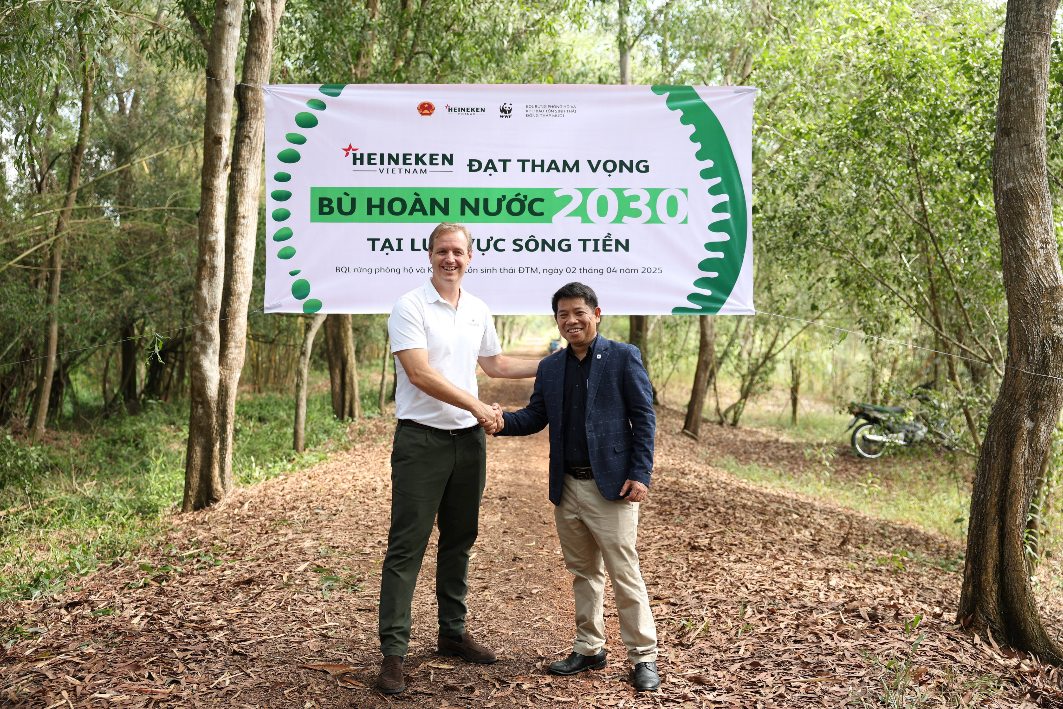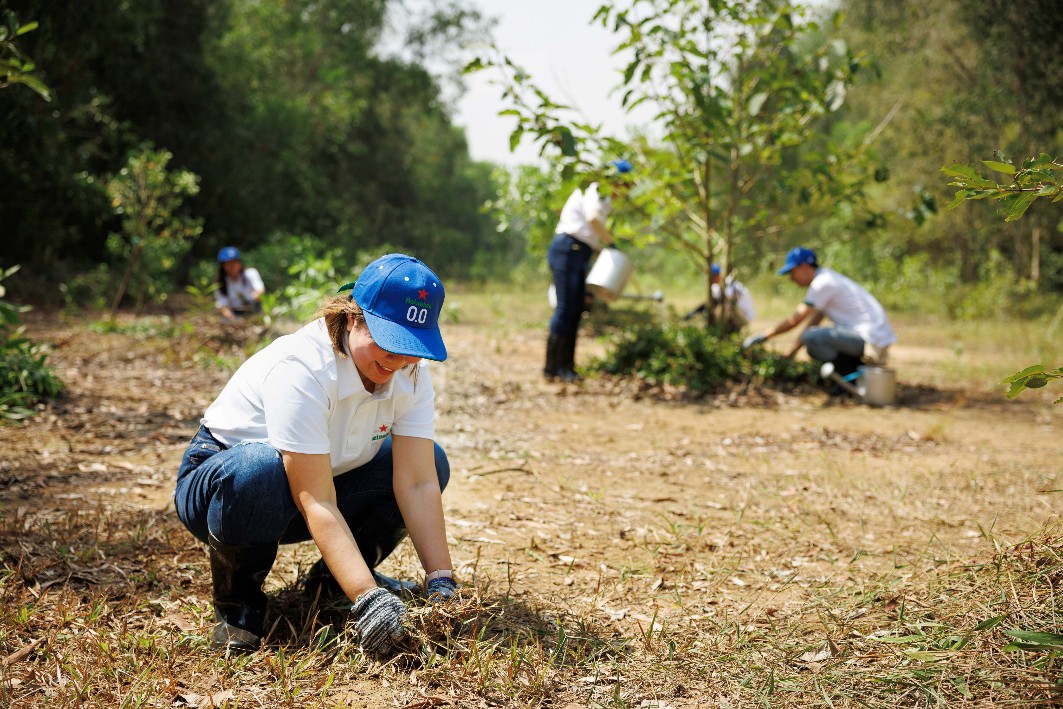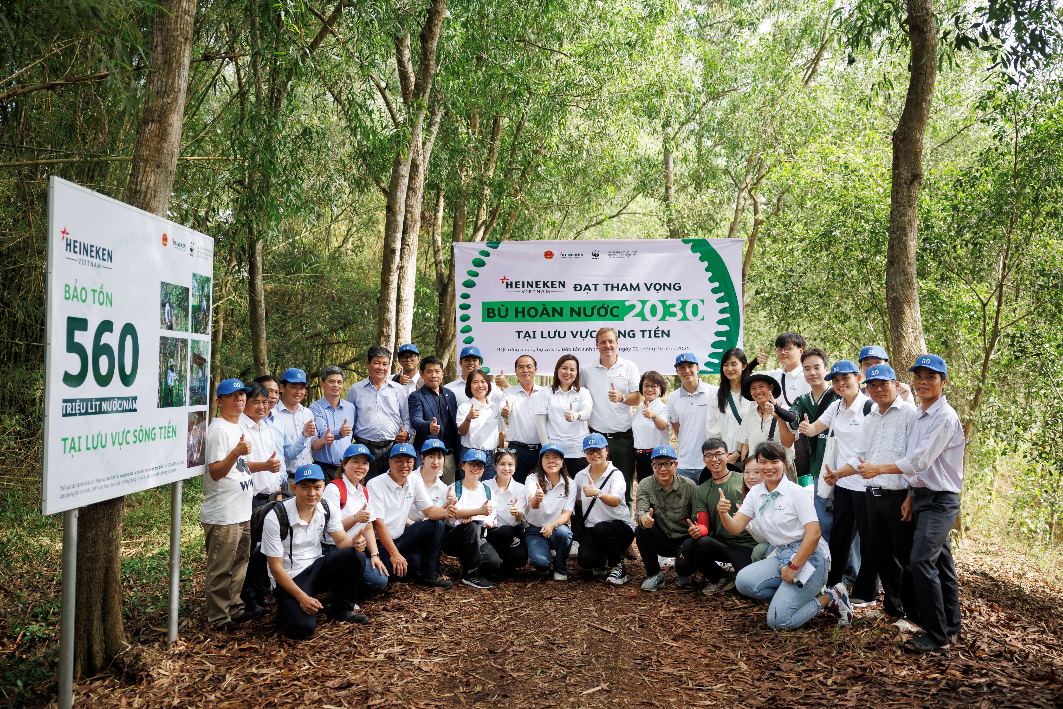HEINEKEN Vietnam has reached a major milestone in its sustainability journey, announcing it has achieved its 2030 water balancing ambition in the Tien River basin five years ahead of schedule. The company has replenished more than 690 million liters of water per year to nature in this critical region, exceeding the volume used in product and production-related evaporation at its brewery in Tien Giang.
This achievement, officially announced on April 3, 2025, is more than a company milestone. It represents a meaningful contribution to Vietnam’s national efforts to conserve water resources, particularly in the context of the Mekong Delta, a region increasingly vulnerable to water stress due to declining groundwater, saltwater intrusion, and prolonged drought.
Scientific calculation meets local commitment
HEINEKEN Vietnam’s replenishment figure of 690,640,000 liters per year is grounded in scientific methods, adhering to the Volumetric Water Benefit Accounting (VWBA) framework developed by the World Resources Institute. The results were assessed by WWF-Vietnam and independently verified by Bluerisk, a global water risk consulting firm.
Of that total, nearly 560 million liters come from conservation efforts such as reforesting 12.3 hectares with Melaleuca and native trees, designing hydrological strategy, upgrading water regulation gates, and providing mobile boat-mounted pumps for fire prevention. An additional 131 million liters stem from community-based clean water projects, including wells, water pipelines, storage tanks, filtration systems, and desalination units in several provinces, including Tien Giang.
A multi-stakeholder model for sustainability
The success in the Tien River basin is the result of a collaborative model that brought together the Ministry of Agriculture and Environment, WWF-Vietnam, provincial authorities, and local ecological management boards. It shows how cross-sector partnerships can address pressing environmental challenges.

“Through strong collaborations, we were able to accelerate progress and achieve this milestone five years ahead of schedule,” said Ms. Pham Thi Truc Thanh, head of Sustainability at HEINEKEN Vietnam. “It is a powerful example of collective action among businesses, governments, and social organizations.”
Besides the Tien River basin, HEINEKEN Vietnam has rolled out water conservation initiatives in the Red and Dong Nai river basins, both of which are vital to the country. Project in the Red River basin is expected to be completed by mid-2025, with ongoing forest maintenance and clean water initiatives planned at all three locations.
Sustainability beyond water
Water stewardship is just one pillar of HEINEKEN Vietnam’s broader environmental strategy. The company has also made considerable progress in energy use and waste management, applying a comprehensive circular economy model aligned with the RESOLVE framework: Regenerate, Share, Optimize, Loop, Virtualize, and Exchange.
As of 2023, HEINEKEN Vietnam has cut carbon emissions in production by 93% compared to 2018. 99% of the energy used in production is renewable, including biomass thermal energy from rice husks and sawdust and biogas recovered from wastewater. The electricity demand is covered by energy attribute certificates sourced from verified solar projects, and the company is actively pursuing further innovation through the Direct Power Purchase Agreement (DPPA) mechanism.
HEINEKEN Vietnam has also upheld its zero-landfill commitment since 2021, ensuring all brewery byproducts are either reused or upcycled. In packaging, 97% of glass bottles and 99% of beer crates are collected and reused, while aluminum cans and boxes are made using recycled materials. Innovative packaging designs, such as thinner cans and wave-T cartons, have reduced raw material use without compromising quality.
In recognition of these efforts, the Vietnam Chamber of Commerce and Industry (VCCI) in 2024 honored HEINEKEN Vietnam as a pioneer in circular economy implementation and greenhouse gas reduction.
Efficiency at the core
Internally, HEINEKEN Vietnam continues to improve its water use efficiency, maintaining a rate of 2.65 hectoliters of water per hectoliter of beer, compared to the industry average of 3.04 hl/hl. Advanced wastewater treatment plants ensure that 100% of wastewater is safely treated before being returned to the environment. At the company’s Vung Tau brewery, an innovative water reclamation plant is in place to repurpose treated water for non-product-contact uses.
The company is also calling for clearer regulations and incentives for treated water reuse in Vietnam, noting that supportive policy frameworks – as seen in Europe – could unlock further potential for water circularity and inter-business collaboration.
Brewing a better Vietnam
HEINEKEN Vietnam’s conservation initiatives in the Red, Dong Nai, and Tien river basins are backed by an investment of VND30 billion funded by the company, with the ambition of conserving three billion liters of water annually across all three basins.

“This is not just about achieving a number,” said Ms. Pham Thi Truc Thanh, head of Sustainability, HEINEKEN Vietnam. “It’s about building resilience for local communities, enhancing biodiversity, and safeguarding Vietnam’s water security for the long term.”
For over 30 years, HEINEKEN Vietnam has remained deeply committed to standing by Vietnam and its people through its sustainability strategy. From improving clean water access in rural communities to advancing energy efficiency and waste management, the company has tied its operations closely to the country’s sustainable development goals. Its recent water balancing achievement is a signal of what is possible when business success is aligned with responsibility.
As Vietnam continues to grapple with the dual pressures of climate change and economic development, HEINEKEN Vietnam’s model offers both inspiration and a practical blueprint for businesses committed to “Brewing A Better Vietnam” – today and for the future.











